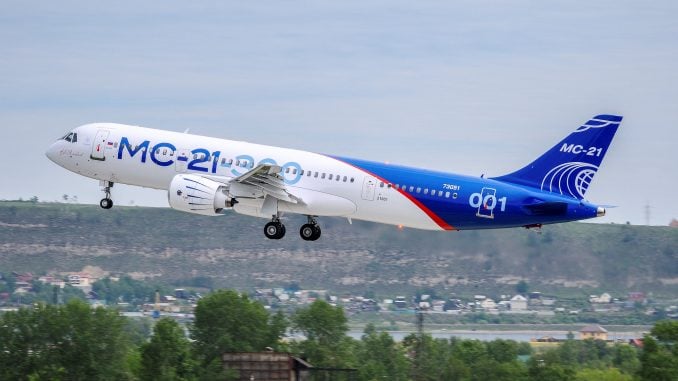
MOSCOW (Reuters) – Russia carried out the maiden
flight of its new MS-21 medium-range passenger plane on Sunday,
its first post-Soviet foray into production of a mainline
commercial aircraft which it hopes will rival those of its
Western competitors.In a surprise statement, manufacturer Irkut Corporation
and its state-controlled parent company United
Aircraft Corporation (UAC) said an MS-21-300 model had
successfully completed a 30-minute flight at a height of 1,000
meters and traveling at 300 km an hour.Squeezed by Western sanctions over its role in the Ukraine
crisis, Russia is trying to rejuvenate domestic industrial
production to make the country less dependant on foreign firms.The test flight, which was not announced to media
beforehand, comes just three weeks after China staged the maiden
flight of its new C919 passenger jet, highlighting the growing
competition to industry heavyweights Boeing and Airbus
.Russian officials have said the MS-21 is superior to its
Western-made counterparts in many respects and will be snapped
up by both Russian and foreign carriers, but Western analysts
say both Russia and China face a huge challenge to shatter the
transatlantic airplane duopoly.”The flight mission has been completed. The flight was fine,
there were no observations which will prevent further testing,”
test pilot Oleg Kononenko was quoted as saying.Western aviation sources however expressed surprise at the
flight’s brevity and relatively low altitude compared with
recent 3-4 hour debuts of North American and European models.”It suggests they either have severe limitations or may have
had something happen and decided to come back,” said a Western
flight test engineer, speaking on condition of anonymity.A Western jetmaking source called it a “genteel flight.”A UAC spokesman said the flight had been long enough to test
everything that needed checking in the air.Russia has fought hard to shake off its Soviet reputation
for old and creaking aircraft flown by inexperienced crews.Flag carrier Aeroflot last year earned its fourth
star from independent ratings website Skytrax, ranking it
alongside major European and Middle Eastern competitors and
ahead of big U.S. carriers such as Delta and United.FIRM ORDERSPresident Vladimir Putin called Irkut General Director Oleg
Demchenko to congratulate him and his employees with what the
Kremlin called “a significant event.”The twin-engine MS-21 will be built in two variants: the
MS-21-300 which will have 160-211 seats, and the later MS-21-200
which will have 130-165 seats. It is sometimes referred to as
the MC-21 when using the Russian name and Cyrillic letters.Production is expected to start in the next two years and
state media have said numerous contracts with domestic and
foreign carriers have already been agreed. Irkut said it so far
had “firm orders” for 175 planes.America’s Boeing and Europe’s Airbus remain far ahead of
their Chinese and Russian rivals, with bigger sales books and
more advanced technical know-how.But the new plane could win sales in Russia and some eastern
European and Asian countries, industry analysts say, with buyers
attracted by its lower running costs.Irkut said operational costs for its new plane will be up to
15 percent cheaper than current generation aircraft.With a range of up to 6,000 kilometers, the MS-21 will be
competing against the Boeing 737 and Airbus A320 aircraft which
currently dominate the medium-range narrow-body market. Both
companies recently upgraded those families to achieve comparable
15 percent operational savings compared to previous versions.State defense conglomerate Rostec, which is headed by close
Putin ally Sergei Chemezov, said it had agreed to purchase 85
aircraft. At least 50 of them will be leased to Aeroflot, Rostec
said, which currently operates a fleet dominated by narrow-body
Airbus models, including 70 A320s.UAC President Yury Slyusar said he estimated global demand
for the new MS-21 models at around 15,000 aircraft over the next
20 years. “I’m sure the airlines will appreciate our new
aircraft,” he said.



